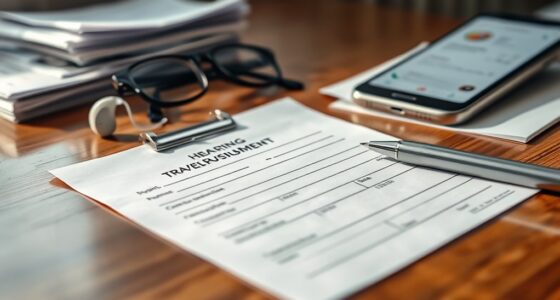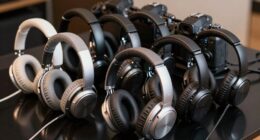To build your case for military occupational noise exposure, document every incident of loud noise and related symptoms like ringing or muffled hearing. Keep detailed logs, medical records, and witness statements that link your exposure to hearing issues. Communicate clearly with authorities, emphasizing your symptoms and exposure duration. Proper evidence and adherence to safety protocols strengthen your claim. If you keep strengthening your documentation, you’ll find it easier to protect your rights and claim benefits.
Key Takeaways
- Document noise exposure details, symptoms, and incidents thoroughly to establish a clear connection between service and hearing issues.
- Collect medical records, audiograms, and witness statements to support claims of noise-induced hearing damage.
- Use clear communication emphasizing exposure duration and symptoms when reporting to authorities or benefits agencies.
- Demonstrate adherence to hearing safety protocols and advocate for improved protective measures to strengthen your case.
- Stay informed about military noise policies and utilize resources on hearing conservation to reinforce your position.
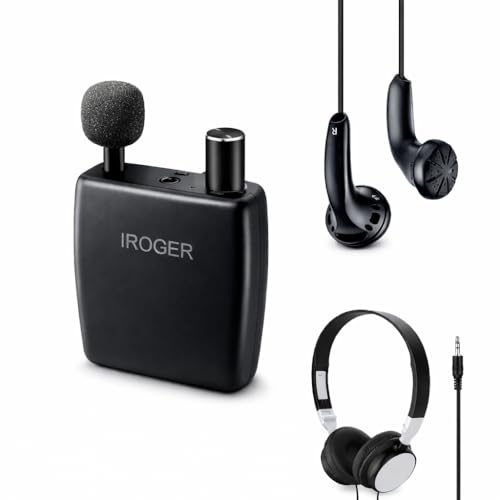
IROGER Hearing Amplifier for Seniors, Personal Sound Amplifier, Smart Auto-Gain, Directional Microphone, Rechargeable with 120-Hour Battery, Headphones & Earbuds Included
Smart Auto-Gain Control – Enjoy crystal-clear sound at all times. iRoger automatically balances audio levels to enhance voices...
As an affiliate, we earn on qualifying purchases.
Understanding the Impact of Noise Exposure on Hearing Health

Noise exposure, especially at high levels common in military settings, can cause immediate and long-term damage to your hearing. Prolonged exposure may lead to hearing loss, making it harder to understand speech and detect sounds. You might also experience tinnitus, a persistent ringing or buzzing in your ears, which can be a warning sign of auditory damage. Tinnitus awareness is essential because it often indicates underlying hearing issues that need attention. The louder and longer you’re exposed to noise, the higher your risk of irreversible damage. Protecting your hearing now can prevent future complications. Using appropriate hearing protection such as earplugs or earmuffs in noisy environments can significantly reduce the risk of damage. Recognizing the signs of noise-induced harm helps you seek timely intervention, reducing the chances of permanent hearing loss and improving your overall auditory health.

IROGER Hearing Amplifier Rechargeable Hearing Device with Standard Headphone Personal Sound Amplifier PSAP for Ears,Seniors,Directional Microphone
Auto Gain Control for Clearer Sound-- Automatically adjusts volume levels to deliver balanced, high-quality sound amplification. Ideal for...
As an affiliate, we earn on qualifying purchases.
Documenting Your Noise-Related Incidents and Symptoms
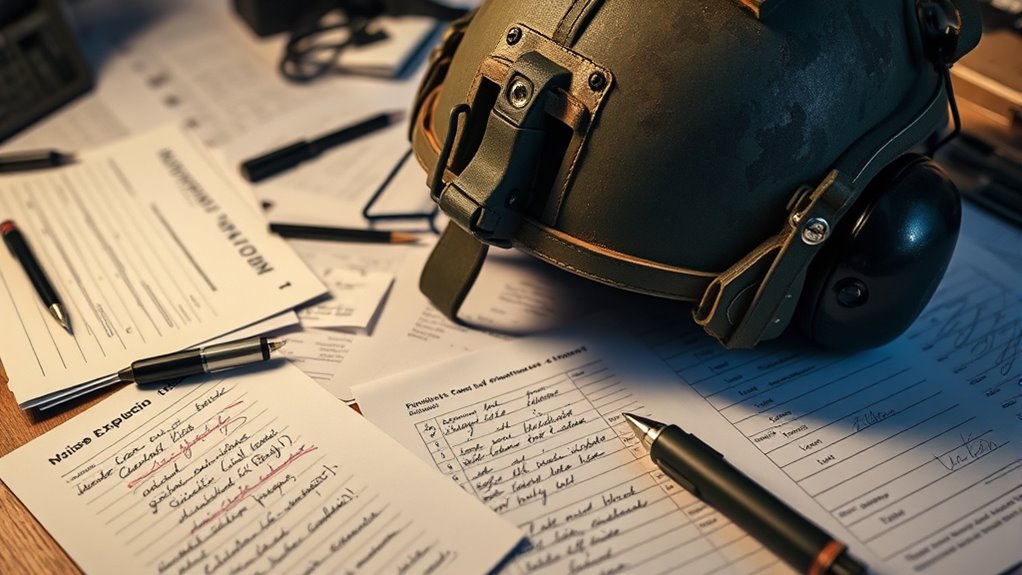
Keeping detailed records of your noise-related incidents and symptoms is essential for protecting your hearing health. Use sensor logs to track exposure durations and intensity levels during shifts, noting when noise levels spike. Record any symptoms like ringing, muffled hearing, or discomfort immediately after incidents. Document dates, times, and specific equipment involved, especially if equipment maintenance issues contributed to higher noise exposure. Regularly reviewing these logs helps identify patterns or recurring problems that could worsen hearing damage. Accurate documentation strengthens your case if you need to report exposure concerns or seek medical evaluation. By systematically recording incidents and symptoms, you build a clear, factual record that supports your efforts to address occupational noise hazards effectively. Incorporating Glycolic acid benefits in your skincare routine can also help improve skin resilience, which is important if exposure to harsh environmental factors occurs.

Personal Sound Amplifier PSAP the Latest Gen Model HA9000, Rechargeable Hearing Aid Device Hearing Amplifier with Headphones, Detachable Microphone, Type-C Charging for Seniors, Adults, Elderly
Advanced Sound Amplification and Noise-Canceling: The Latest Gen HA9000 personal sound amplifier features Auto-Gain Control for clearest amplification,...
As an affiliate, we earn on qualifying purchases.
Gathering Supporting Evidence and Medical Records
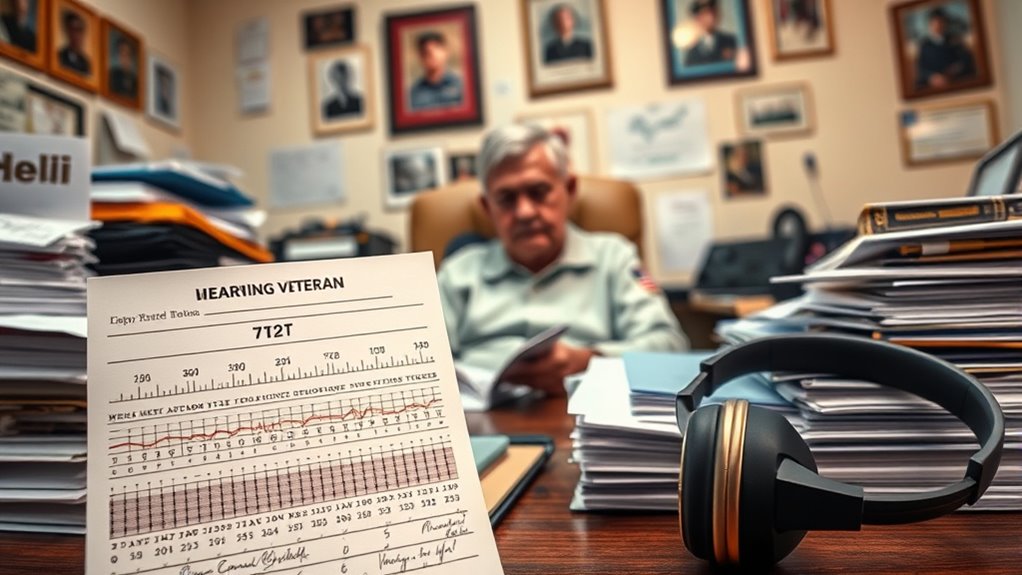
You need to gather all relevant medical documentation that shows your hearing issues and noise exposure. Securing witness statements from coworkers or supervisors can strengthen your case. Make sure all evidence is thorough and organized to support your claim effectively. Including documentation of your exposure to occupational noise and any prior audiological assessments can further bolster your case.
Collect Medical Documentation
Gathering medical documentation is a vital step in establishing a clear connection between military occupational noise exposure and your health condition. You should collect your complete medical history, including any previous diagnoses related to hearing loss or tinnitus. Make sure to gather records from all doctor consultations, audiograms, and hearing tests you’ve undergone. These documents provide essential evidence of your condition’s progression and link to your military service. Contact your healthcare providers to obtain detailed reports, ensuring they include dates, symptoms, and treatment notes. Having comprehensive medical records strengthens your case by demonstrating a consistent history of hearing issues tied to your occupational noise exposure. Additionally, understanding the importance of color accuracy and how it impacts overall image quality can help in evaluating the precision of your medical imagery and audiograms. This documentation is crucial for supporting your claim and building a solid foundation for your case.
Secure Witness Statements
Have witnesses who observed your hearing difficulties or occupational noise exposure provided valuable firsthand accounts? Securing their statements can strengthen your case, but it’s essential to verify statement accuracy. Focus on witnesses with credible witness credibility, such as coworkers or supervisors who directly observed your symptoms or environment. When gathering statements, encourage them to be specific about what they saw or heard and when these events occurred. Clear, detailed accounts help establish a timeline and support your claim. Avoid vague or inconsistent descriptions, as they can weaken your case. Well-documented witness statements, combined with medical records, create a compelling narrative of your occupational noise exposure and its impact on your hearing health. This approach builds a stronger, more credible case for your disability claim. Additionally, understanding lucid dreaming techniques can help you manage stress and improve sleep quality, which may positively influence your recovery process.

Bone Conduction Headphones, Open Ear Bluetooth Sport Headphones, IPX6 Sweat Resistant, Bluetooth V5.4, 10H Playtime, Comfortable Fit Wireless Earbuds with Mic for Running, Gym, Cycling, Outdoor, Black
Open-Ear Comfort, 28g Feather-Light Fit - Stay aware while you listen. These bone conduction open-ear headphones weigh just...
As an affiliate, we earn on qualifying purchases.
Communicating Effectively With Medical and Military Authorities
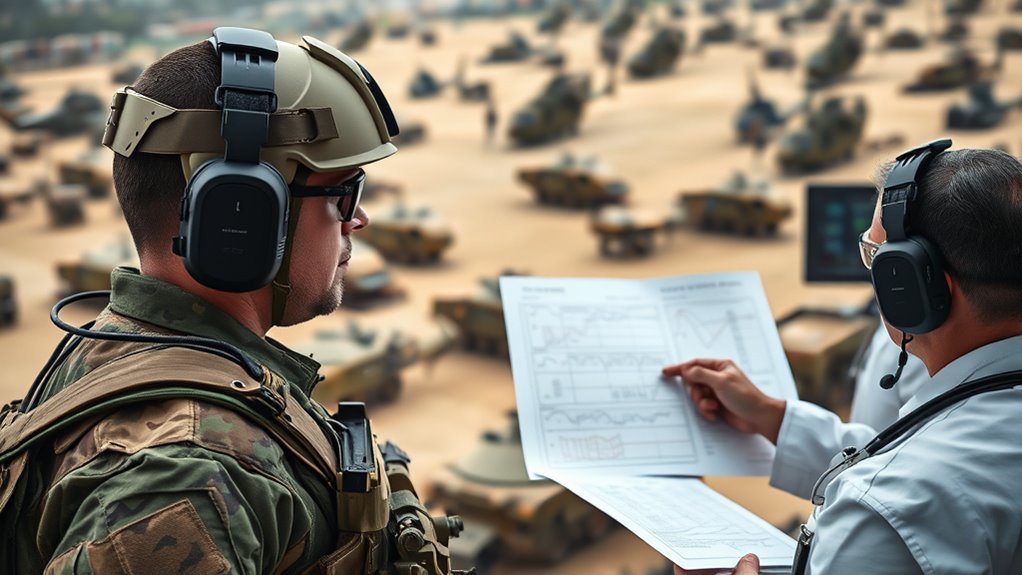
Effective communication with medical and military authorities is essential for addressing occupational noise exposure concerns. To do this effectively, use clear language and avoid excessive technical jargon that might cause misunderstandings. Be prepared to explain your situation simply and accurately, emphasizing key details like exposure duration and symptoms. Understanding legal considerations is vital; know your rights and be aware of documentation requirements for your claims or reports. When discussing your case, stay focused on facts rather than assumptions, and ensure your communication is professional and respectful. Keep records of all interactions, including emails and official reports. This approach helps build credibility and guarantees your concerns are taken seriously, increasing the likelihood of a positive resolution. Additionally, understanding the importance of proper space and organization can help you present your case more effectively by clearly outlining your living or working environment.
Navigating the Claims Process for Compensation and Benefits

Facing the claims process for compensation and benefits can feel overwhelming, but understanding each step helps you move forward with confidence. Start by reviewing military policies that outline your eligibility for veteran benefits related to occupational noise exposure. Gather all necessary documentation, including medical records, service records, and any expert evaluations. Submit your claim through the appropriate channels, such as the VA or military benefits office. Be prepared for follow-up requests and appeals if needed. Staying organized and informed about your rights under military policies guarantees you don’t miss critical deadlines or evidence requirements. By taking a proactive approach, you can streamline the process and improve your chances of receiving the compensation and benefits you deserve for occupational noise exposure.
Tips for Advocating for Your Hearing Health and Rights

Taking charge of your hearing health is essential to guarantee your rights are protected and your needs are met. To advocate effectively, prioritize noise mitigation strategies and support hearing conservation efforts. Here are four tips:
- Document exposure incidents and symptoms to strengthen your case.
- Communicate openly with medical providers about your noise exposure history.
- Educate yourself on noise regulations and your rights under military policies.
- Push for regular hearing assessments and proper use of hearing protection devices.
- Familiarize yourself with best practices for hearing protection to better understand how to minimize noise exposure effectively.
Frequently Asked Questions
How Can I Prevent Noise-Induced Hearing Loss During Military Operations?
To prevent noise-induced hearing loss during military operations, you should always use personal protective equipment like earplugs or earmuffs. Participating in hearing conservation programs helps you understand risks and proper protection techniques. Be proactive by consistently wearing your gear, especially around loud noises, and follow safety protocols. Regular hearing checks also guarantee early detection of any issues, protecting your hearing health in demanding environments.
Are There Specific Military Roles More at Risk for Noise Exposure?
Imagine standing amidst roaring engines and gunfire, your ears ringing from the relentless noise. Combat roles and aviation personnel face higher risks because of constant exposure to loud sounds like gunfire, explosions, and jet engines. These roles demand extra vigilance—wear proper hearing protection, take regular breaks, and stay aware of noise levels. By doing so, you safeguard your hearing and ensure you’re prepared for whatever mission lies ahead.
What Are the Long-Term Health Effects of Unchecked Noise Exposure?
Unchecked noise exposure can lead to serious long-term health effects, including noise-induced damage and chronic hearing loss. You might notice ringing in your ears, difficulty understanding speech, or a persistent muffled sound. Over time, these issues worsen, impacting your quality of life. Protecting your hearing early prevents irreversible damage, so always use hearing protection in noisy environments and get regular hearing checkups to catch problems early.
Can Hearing Protection Devices Completely Eliminate Noise-Related Damage?
Like a shield in a battle, hearing protection provides vital noise mitigation, but it can’t completely block every threat. You might wear hearing protection, yet some noise can slip through, especially at high levels or over time. While it greatly reduces the risk of damage, it doesn’t guarantee total elimination. To safeguard your hearing fully, combine proper protection with other safety measures and regular hearing checks.
How Often Should Service Members Undergo Hearing Assessments?
You should undergo hearing assessments regularly to monitor your hearing health. The recommended hearing test frequency varies based on your exposure level and assessment protocols, but typically, service members should have a baseline test upon entering service and annual evaluations afterward. Consistent assessments help catch early signs of noise-induced hearing loss, ensuring timely intervention and protection strategies. Staying proactive with hearing tests is essential for maintaining excellent hearing throughout your military career.
Conclusion
Your voice is your strongest weapon in fighting for your hearing health. Think of your evidence as a lighthouse guiding you through the stormy seas of military claims. With each document and conversation, you’re building a fortress of support around your rights. Stay persistent, stay informed, and remember—your fight isn’t just about hearing; it’s about ensuring your voice echoes loudly and clearly for years to come.






